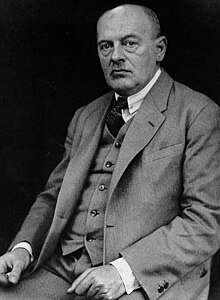Max Scheler
| Max Scheler | |
|---|---|
 |
|
| Born |
Max Ferdinand Scheler 22 August 1874 Munich, German Empire |
| Died | 19 May 1928 (aged 53) Frankfurt am Main, Germany |
| Era | 20th-century philosophy |
| Region | Western Philosophy |
| School |
Phenomenology Munich phenomenology |
|
Main interests
|
History of ideas, Value theory, Ethics, Philosophical anthropology, Consciousness studies, Cultural criticism, Sociology of knowledge, Religion |
|
Notable ideas
|
Value rankings, emotional intuition, value-based ethics, stratification of emotional life, ressentiment |
|
Influenced
|
|
Max Ferdinand Scheler (German: [ˈʃeːlɐ]; 22 August 1874 – 19 May 1928) was a German philosopher known for his work in phenomenology, ethics, and philosophical anthropology. Scheler developed further the philosophical method of the founder of phenomenology, Edmund Husserl, and was called by José Ortega y Gasset "the first man of the philosophical paradise." After his death in 1928, Martin Heidegger affirmed, with Ortega y Gasset, that all philosophers of the century were indebted to Scheler and praised him as "the strongest philosophical force in modern Germany, nay, in contemporary Europe and in contemporary philosophy as such." In 1954, Karol Wojtyła, later Pope John Paul II, defended his doctoral thesis on "An Evaluation of the Possibility of Constructing a Christian Ethics on the Basis of the System of Max Scheler."
Max Scheler was born in Munich, Germany on 22 August 1874 to a Lutheran father and an Orthodox Jewish mother. As an adolescent, he turned to Catholicism although he became increasingly non-committal around 1921. After 1921 he disassociated himself in public from Catholicism and the Judeo-Christian God, committing himself to philosophical anthropology.
Scheler studied medicine at the University of Munich. He also studied philosophy and sociology under Wilhelm Dilthey, Carl Stumpf and Georg Simmel at the University of Berlin. He received his doctorate in 1897 at Munich with a thesis entitled Beiträge zur Feststellung der Beziehungen zwischen den logischen und ethischen Prinzipien. He earned his habilitation in 1899 at the University of Jena with a thesis entitled Die transzendentale und die psychologische Methode and directed by Rudolf Eucken, and became Privatdozent there in 1901. Throughout his life, Scheler entertained a strong interest in the philosophy of American pragmatism (Eucken corresponded with William James).
...
Wikipedia
